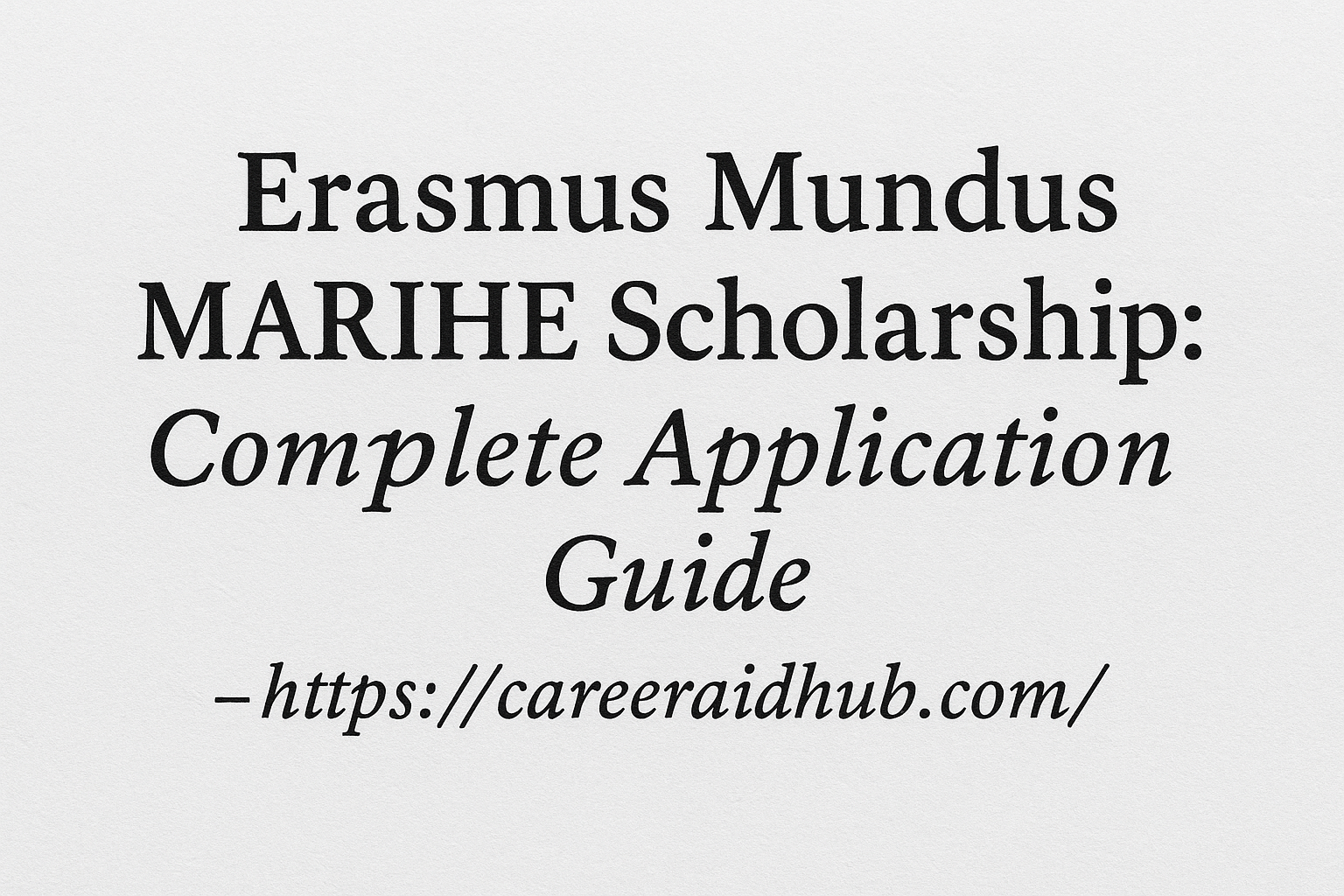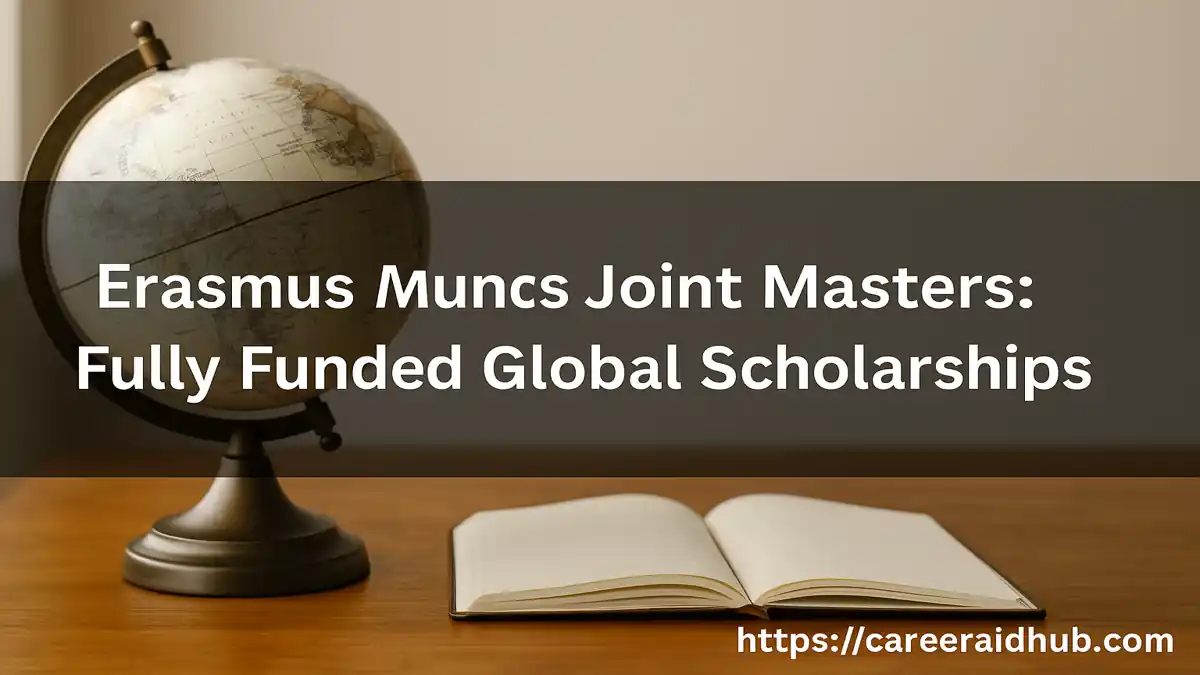Introduction
The MARIHE – Master in Research and Innovation in Higher Education is an Erasmus Mundus Joint Master’s that trains future leaders for universities, research organizations, ministries, and international agencies. The programme combines multi-country mobility, innovative coursework, and a competitive scholarship that eases financial barriers for strong applicants. Official application steps and the current intake calendar are published on the programme website and should be treated as the single source of truth.
Build a career in higher-education leadership with the Erasmus Mundus MARIHE – Master in Research and Innovation in Higher Education. Study across countries, gain policy and management expertise, and compete for a scholarship that covers tuition, mobility, and living support. Prepare a precise, evidence-based application to stand out.
What the MARIHE Programme Is—and Why It Matters
MARIHE focuses on how higher education systems and research and innovation ecosystems evolve, are governed, and are managed. You learn to:
- Analyze policy reforms and funding models.
- Lead organizational change in universities, research councils, and innovation agencies.
- Use evidence-based methods—from policy evaluation to institutional data analytics.
Because learning takes place in multiple countries, you experience contrasting regulatory frameworks, quality
What Makes MARIHE Stand Out
- Structured mobility: You study at two or more consortium universities, which deepens comparative insight and broadens your network.
- Strong employability focus: Case studies, project work, and placements link theory to practice.
- International cohort: Diverse professional and regional backgrounds create a peer network that often becomes a long-term career asset.
- Scholarship options: Erasmus Mundus support typically covers tuition, monthly subsistence, and travel/installation contributions for selected candidates.
Funding Package: What the Scholarship Usually Covers
While specific amounts and conditions differ by call, a typical Erasmus Mundus package for MARIHE includes:
- Full tuition coverage for the two-year programme.
- A monthly subsistence allowance during mobility months (usually payable only when you are physically at a consortium location, with noted exceptions).
- Travel and installation contributions, which reflect your residence status and the distance to host locations.
- Insurance that meets EU standards, plus administrative costs set by the consortium.
Important: Always verify the current call’s scholarship rules. The programme may adjust allowances, eligibility constraints, or payment rules for a given intake.
Who Should Apply: Ideal Profiles and Minimum Requirements
MARIHE recruits motivated graduates
- A recognized bachelor’s degree (or equivalent) in fields such as public policy, economics, management, education, political science, sociology, or adjacent disciplines.
- Proof of English proficiency that meets consortium thresholds (accepted tests and alternatives are specified in the call).
- A focused motivation letter that links personal goals to the programme’s thematic core.
- Demonstrated potential for policy analysis, organizational leadership, or evidence-informed decision-making. Related internships, projects, or public-sector/NGO experience strengthen an application but are not always mandatory.
If your trajectory is non-traditional, make the alignment explicit: explain the academic or professional problem you care about, the methods you already use, and how MARIHE will multiply your impact.
Key Documents: Build an Error-Free File
Start early and respect every instruction on file type, size, and naming:
- Degree certificate(s) and transcript(s) with the grading scale.
- Curriculum vitae emphasizing policy, governance, or analytical work.
- Motivation letter (clear structure, concise language, concrete examples).
- Two recommendations on letterhead, signed and dated (academic or professional).
- English proficiency proof as required for the specific intake.
- Passport copy and any residency documents relevant for scholarship classification.
- Any additional items named in the portal (e.g., writing sample, research brief, or portfolio evidence).
Pro Tip: Merge
Application Process and Timetable: What to Expect
Although each intake publishes its own calendar, the workflow typically follows six stages.
1) Register on the Online Portal
Create your account, complete personal and educational sections, and indicate your interest in Erasmus Mundus funding if eligible.
2) Upload Documents
Submit every required file in the stated format and size. If compression is needed, prioritize legibility and keep seals/signatures clear.
3) Eligibility Screening
The programme office verifies completeness, degree level, language proof, and formal compliance with call conditions.
4) Academic Evaluation
Selection panels assess your fit with MARIHE, academic quality, motivation, methodological readiness, and reference strength. Shortlisted candidates may join a remote interview focused on analytical reasoning, communication, and alignment.
5) Results and Offer
Successful candidates receive an admission decision specifying scholarship or self-funded status. The letter outlines acceptance steps, document verification, and next actions for the first mobility semester.
6) Practical Arrangements
Proceed with visa, insurance,
Timetable guide: Calls usually open several months ahead of programme start. For the next cycle, anticipate a similar window and plan your language tests and recommendation requests accordingly. We will update soon with the published month-and-year milestones.
How Files Are Assessed: The Four Pillars
- Academic merit: Transcript strength, methods exposure, and the capacity to work at master’s level.
- Motivation and fit: A persuasive narrative tying your goals to MARIHE’s mission (governance, management, reform, and innovation).
- References: Specific, credible endorsements that corroborate skills and character.
- Cohort value: Added diversity of perspective, sectoral experience, or regional knowledge.
To stand out, anchor your story to measurable outcomes you have delivered—policy memos, dashboards, evaluation projects, governance initiatives, or student leadership with documented effects.
Costs, Living, and Logistics
- Tuition: Scholarship recipients have tuition waived; self-funded students pay fees set by the consortium.
- Living costs: Rent and transport vary across host cities. Prepare a location-specific budget for each mobility step.
- Insurance and visas: Follow the guidance supplied in your offer pack; Erasmus Mundus scholarships generally include compliant insurance.
- Housing: Universities may provide listings or assistance. Apply early in high-demand locations.
Career Outcomes: Where MARIHE Graduates Work
Alumni commonly move into:
- University strategy and leadership (rectorates, institutional research, quality management).
- Public agencies and ministries (funding policy, regulation, QA).
- International organizations and NGOs (programme design, evaluation, capacity building).
- Research analytics and EdTech (data products, decision-support tools, benchmarking).
- Doctoral studies in higher-education research, public management, or innovation policy.
Your cross-country study track doubles as a career network—maintain active connections with supervisors, mentors, and peers across hosts.
Ten Actionable Tips for a Strong Application
- Begin early: book language tests and request references before the portal opens.
- Target a policy or management problem: show why it matters and how you will study it.
- Show methods readiness: policy analysis, statistics, programme evaluation, or qualitative design.
- Quantify contributions: “Led a QA audit that cut processing time by 25%,” not just duties.
- Explain the mobility logic: what each host adds—datasets, supervision, policy context.
- Demonstrate leadership: student governance, project coordination, mentoring, or community impact.
- Write clearly: 2–4-line paragraphs, signposted subheadings, and active voice.
- Follow every rule: page limits, file names, and formats are non-negotiable.
- Practice for interviews: prepare concise, evidence-based answers and a 60-second pitch.
- Back-up finance plan: consider alternative scholarships in case you receive an unfunded offer.
Feature Table
Feature | Details |
Program Name | Erasmus Mundus MARIHE – Master in Research and Innovation in Higher Education |
Host Country/Region | Multi-country mobility across consortium universities |
Funded By | Erasmus Mundus (European Union) and programme consortium |
Duration | Two years |
Study Mode | Full-time, in-person; multi-country mobility |
Eligibility | Recognized bachelor’s degree; English proficiency; strong motivation and fit |
Financial Support | Tuition waiver, monthly subsistence allowance, travel and installation contribution, insurance (call-specific) |
Fields of Study | Higher-education studies, public management, research and innovation policy, organizational change |
Deadline | Next cycle months to be announced—we will update soon |
Official Website |
Conclusion
The Erasmus Mundus MARIHE Scholarship offers a rare combination of academic depth, international mobility, and practical training for future leaders in higher education and research management. By crafting a precise motivation letter, demonstrating methods-ready skills, and aligning your mobility plan with concrete learning goals, you present a compelling case for admission and funding. For authoritative instructions, required documents, and the intake calendar, consult the programme’s official application page and follow its updates closely.
References
Frequently AskedQuestions (FAQs)
It funds selected students in the MARIHE joint master’s, covering tuition, monthly allowance, and travel/installation contributions during multi-country study mobility.
Applicants need a recognized bachelor’s degree, proven English proficiency, strong motivation, and clear fit with higher education governance, management, or innovation policy.
Competition is high. Committees assess academic merit, motivation, references, methodological readiness, and cohort contribution during document review and possible interviews.
Typically tuition, subsistence allowance during mobility months, insurance, and travel/installation contributions as defined by the programme’s current call.
Yes, unless you qualify for accepted alternatives. Provide valid evidence that meets the programme’s minimum language requirements.
Yes. However, you should demonstrate analytical skills, domain motivation, and alignment with MARIHE’s focus through projects, internships, or academic work.
They examine academic record, statement of purpose, recommendation letters, methods readiness, and how your goals match MARIHE’s mission and mobility design.
Prepare degree certificates, transcripts with grading scale, CV, motivation letter, two recommendations, English proof, passport, and any items specified by the portal.
After eligibility screening and academic evaluation. Timelines vary by intake; therefore, monitor your portal and email for interview invitations and decisions.
Graduates work in university strategy, ministries, QA agencies, NGOs, international organizations, research analytics, or continue to doctoral studies in related fields.



